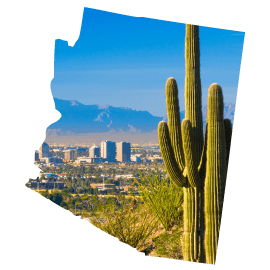Secondary Teacher Preparation in Science:
Arizona
Delivering Well Prepared Teachers Policy
Analysis of Arizona's policies
Arizona offers an endorsement in secondary general science, which is comprised of 12 semester hours of life science courses and 12 semester hours of physical science courses. Because a proficiency assessment is not offered in this subject area, the state only requires 24 semester hours of subject-related courses from an accredited institution; a content test is not required. Teachers with this license are not limited to teaching general science but rather can teach any of the topical areas, including biology, chemistry and physics. Further, although Arizona requires secondary teachers to be highly qualified in each specific subject area (e.g., biology, chemistry), this requirement does not ensure that they will have passed a content test.
There is an optional middle-grades general science endorsement for teachers who already have either an elementary or secondary certificate. Teachers holding a valid elementary or secondary teaching certificate who want to attach a middle-grades general science area must pass the AEPA "Middle Grades General Science" test. Arizona also allows middle school science teachers to teach on a generalist K-8 license (see Goal 1-E).
Recommendations for Arizona
Require secondary science teachers to pass tests of content knowledge for each science discipline they intend to teach.
States that allow general science certifications—and do not require content tests for each area—are not ensuring that these secondary teachers possess adequate subject-specific content knowledge.
Require middle school science teachers to pass a test of content knowledge that ensures sufficient knowledge of science.
Although the state requires a specific middle grades science test for its middle-grades science endorsement, this endorsement is optional. Therefore, Arizona does not ensure that all middle school teachers possess adequate knowledge of science.
State response to our analysis
Arizona asserted that the approved area of general science only allows teachers to be appropriately certified to teach general science at the high school level. The state added that teachers must have the appropriate science content as an approved area to be appropriately certified. Arizona currently has AEPA exams for the following science content areas: biology, chemistry, earth science, middle grades general science and physics. The state also noted that it uses the term "approved area," rather than endorsement.
Last word
NCTQ is unable to find policy that limits teachers with a general science certificate to teach only general science courses. Rather than rely on assumed common understandings regarding which courses a teacher with a general science certificate may or may not teach, Arizona should articulate a specific policy ensuring that all science teachers are required to pass a subject-specific content test for each area they plan to teach.
Select another topic
Delivering Well Prepared Teachers
- Admission into Preparation Programs
- Elementary Teacher Preparation
- Elementary Teacher Preparation in Reading Instruction
- Elementary Teacher Preparation in Mathematics
- Middle School Teacher Preparation
- Secondary Teacher Preparation
- Secondary Teacher Preparation in Science
- Secondary Teacher Preparation in Social Studies
- Special Education Teacher Preparation
- Assessing Professional Knowledge
- Student Teaching
- Teacher Preparation Program Accountability
Expanding the Pool of Teachers
Identifying Effective Teachers
- State Data Systems
- Evaluation of Effectiveness
- Frequency of Evaluations
- Tenure
- Licensure Advancement
- Equitable Distribution

